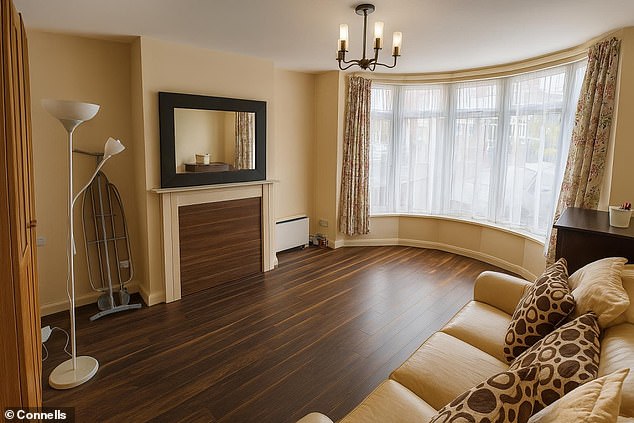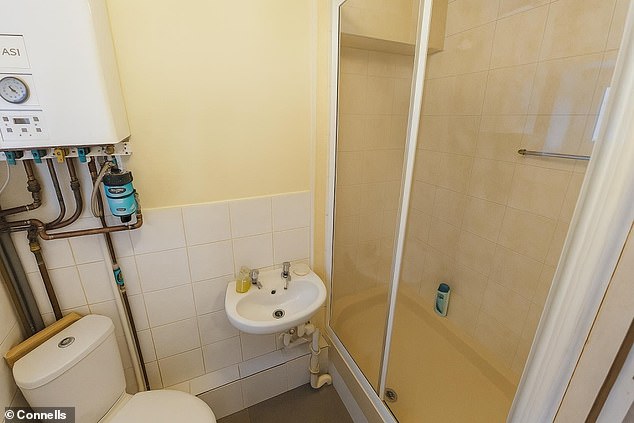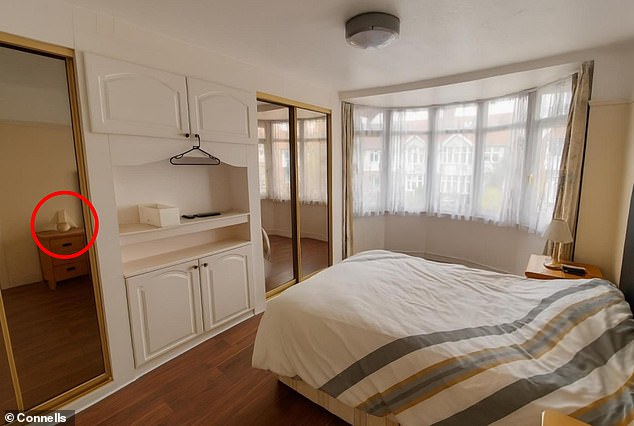An estate agent appears to have used AI to enhance photographs of a rental property listing in the UK with mixed results – with image enhancement software installing laminate flooring in the fireplace and removing the handle from the front door.
The four-bed house on White Road in the Cowley area of Oxford appears to have been the subject of some over-enthusiastic photo editing in a bid to make the property look more appealing to would-be tenants.
But artificial intelligence software seemingly used to touch-up the pictures have given the images some bizarre details – including wooden laminate flooring in the fireplace, no handle on the front door and eerily clean surfaces.
MailOnline ran the photographs through a number of artificial intelligence detection tools, which suggested that the photographs appeared to bear the hallmarks of AI image manipulation.
Some of the pictures appeared to have unrealistically blue skies, one analysis tool suggested, as if the typical cloudy skies of Britain had been removed to make the property look more enticing.
But while the front door had apparently been stripped of its door handle and the car in the driveway had been stripped of its badges and number plate, no amount of apparent manipulation could remove the weeds from the driveway.
Experts have suggested that such manipulation will only irk house-hunters and prospective tenants, who could arrive to find the house looks nowhere near as clean or colourful as the images suggest.
But estate agents Connells – recently implicated in a preferential selling scandal that saw it allegedly sell homes to its mortgage customers rather than higher bidders – maintains that the listing is ‘fair and accurate’.
Spot the difference: the seemingly AI-enhanced image of the house (left) versus a real-world photograph with a more muted colour palette… and a front door handle (right)

The ‘enhanced’ photographs appear to feature interesting design choices such as a wooden laminate fireplace – and a bucket of stationery that does not match its reflection
The house listing first appeared on internet message board Reddit, where users suggested that the images of the house were real – but had been fed through AI image manipulation software to make them look ‘nicer’.
The photographs appear to be based on real pictures taken at the property – but have undergone modification to make them more appealing.
Close examination of the images show they bear the hallmarks of AI – with erratic smudging and odd proportions of small details.
The external view of the property featured an extraordinarily blue sky and extremely saturated colours. The front door’s window sits out of skew with the frame – and the door itself has no handle.
Inside, the living room features a fireplace patched up with laminate floorboards identical to that used on the floor itself. Oddly, a pot packed with stationery on a table appeared to be almost empty when reflected in the feature mirror on the wall.
One bedroom appeared to have a table lamp that melted into the wall behind it.
In the bathrooms, products such as shower gel and soap had smudged, unreadable labels – a telltale sign of AI use.
Some of the images in the listing did not appear to have been manipulated. But the Oxford listing illustrates a growing trend for AI use in more industries, including among estate agents.
There are multiple tools targeted at estate agents online that promise to use AI to spruce up property listings – sold as tools to help them save time and move homes on quicker.
One offers to remove dirt, brighten up a room and even replace the sky in exterior photographs for £1.20 per picture.
‘Don’t let a gloomy day ruin your photos,’ it notes.
But experts have warned that using AI to ‘enhance’ property listings could be misleading – and may ultimately frustrate house-hunters when a home is nowhere near as rosy as the pictures make it look.

A photograph of one of two shower rooms features odd details, such as an unreadable shampoo bottle – a sign of AI image generation

One image of a bedroom appeared to feature a lamp melting into the wall behind it, reflected in the mirror
Sam Richardson, deputy editor of Which? Money, said: ‘Finding the right home to buy or rent can be tricky enough without having to worry about AI or edited images.
‘With home buyers and renters likely needing to view several properties, this could waste their time and money travelling to viewings of properties that look nothing like they do online.
‘But this also makes it even more important to view a property in person before parting with any money – and if buying a home, strongly consider getting a survey.’
A Connells spokesperson insisted the listing was ‘fair’, without commenting on the apparent use of AI.
They said: ‘All of our listings are fair and accurate. They allow people to see what is on the market and help them to decide whether or not they might wish to view a property.’
The representative declined to answer MailOnline’s questions on whether it would be using AI on future listings.
The use of AI to enhance photographs has sparked concern elsewhere in the world amid concerns that it could be used to cover up flaws in properties.
In Australia, the New South Wales state government has announced legislation requiring estate agents to declare if AI has been used to add some sheen to listings.
Legislators said they had seen examples of estate agents using AI to fit a double bed into a room that was only big enough for a single, and of using AI to disguise damage.
It comes days after the estate agent was implied to have engaged in conditional selling, against the UK industry code of practice.
A BBC Panorama investigation found staff were allegedly prioritising customers who used their in-house services for conveyancing and mortgaging when it came to house sales.
Sometimes, the programme claimed, this would even involve potentially higher bids being overridden in favour of a lower bid from a Connells customer.
In a statement, the estate agent rejected ‘any accusation of conditional selling’ and that ‘no harm has been caused’ to the customer.
It added: ‘It is not the case that customers who use our mortgage services are more likely to successfully purchase a property than those who do not.’














